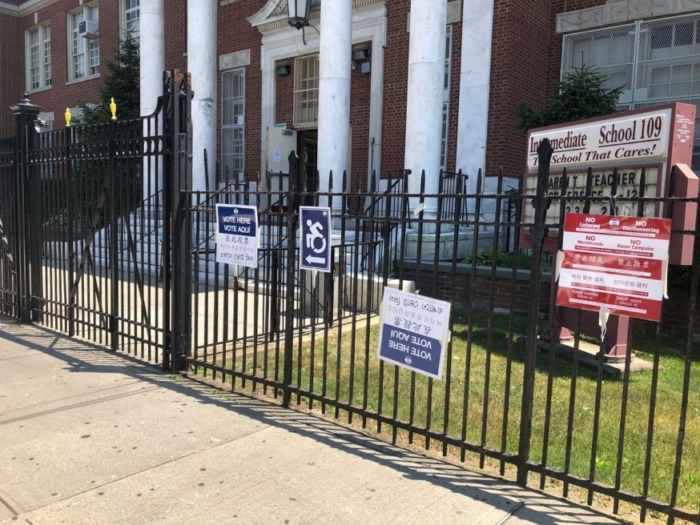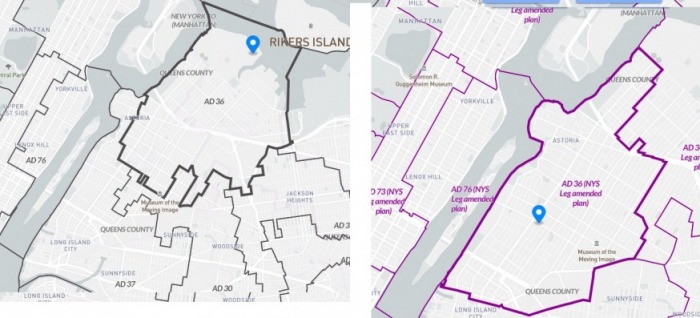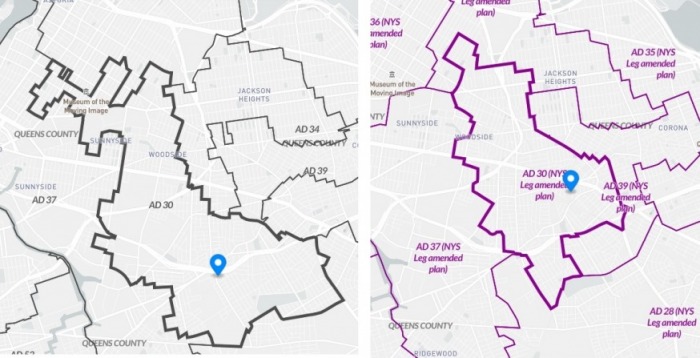
Polling Site in Queens Village (QueensPost)
May 12, 2022 By Christian Murray
The New York Assembly races will go ahead as planned on June 28, despite a legal challenge saying that the district maps needed to be redrawn and the primaries delayed.
Justice Patrick McAllister of Steuben County Supreme Court agreed with two plaintiffs saying that the maps were created in an unconstitutional manner but said that there was a lack of time to redraw them and that there were no motions from Republican or Democratic leaders calling for them to be redrafted.
The lawsuit was filed by Gary Greenberg, an Albany-based activist, and Gavin Wax, the leader of the New York Young Republican Club.
The decision comes about a month after McAllister ruled that the state senate and congressional maps needed to be redone, saying that they were drawn unconstitutionally by state Democrats in the legislature. The Court of Appeals, the state’s highest court, agreed with his ruling.
The Assembly districts, however, also underwent significant change but they were not challenged by Republican leaders. In fact, both the Republicans and Democrats in the Assembly opposed the plaintiffs’ lawsuit.
The battle for control of the Assembly is not viewed as competitive, which is why the maps were not initially challenged. The chamber has been in the hands of the Democrats since 1975 and that is unlikely to change.
However, the control of the state senate is competitive. While the Democrats have had outright control since 2018, it has mostly been under Republican control since the 1940s.
The assembly districts in Queens, nevertheless, underwent significant change after the Democratic legislature redrew the maps.
For instance, Zohran Mamdani lost almost half his 36th Assembly District, with most of the Ditmars/Steinway moved to the 34th district. The 36th district now includes vast new areas—such as Queensbridge, Ravenswood and Astoria Houses as well as the Court Square/Queens Plaza section of Long Island City. These areas had been part to the 37th Assembly District.

The current Assembly District 36 Map (left) vs. the new map (Source: RedistrictingandYou.org)
The 30th Assembly District, currently represented by Brian Barnwell, also underwent significant change, with significant portions reassigned to neighboring districts. Barnwell has announced he is not seeking reelection.
The primaries for the state senate seats and congress are scheduled for Aug. 23.
A court-appointed special master is crafting new maps and has until May 20 to complete them. The candidates in these races are in limbo until the new lines are drawn.

District 30 underwent significant change following the redistricting. The map on the left is the district today, the map on the right is the new district (RedistrictingandYou.org)
One Comment

After the 1982 reapportionment, Democrats eliminated the districts of Queens GOP Assembly members Rosemary Gunning, John LoPresto, John Flack, Al DelliBovi and John Esposito. John Gallagher gave up his Assembly seat in 1972 to run unsuccessfully against Democratic congress member Lester Wolff.. Doug Prescott briefly recaptured this seat in the 1990s, but eventually lost, leaving Queens with no GOP Assembly members.
GOP state senators Frank Padavan and Martin Knorr voted for this reapportionment plan as it continued to protect their own gerrymandered districts. In 1977, Republican Rabbi Sheldon Farber won a special election to fill a vacant seat against Democrat State Assembly member Gerdi E. Lipchutz despite a 4 to 1 Democrat versus Republican voter registration advantage. This temporarily gave the Queens GOP a record three State Senators. Farber declined to run in 1978 as he knew the odds were against him winning a full term in what traditionally was a safe Democratic State Senate seat.
Despite overwhelming Democratic Party enrollment in Queens County, creative gerrymandering by the GOP-controlled State Senate after the 2000 census continued to preserve the seats of both Republican state senators Serphin Maltese and Frank Padavan. Eventually Democrats beat Maltese in 2008 and Padavan in 2010.
Queens Republicans are on the way to political extinction, According to the State Board of Elections, as of February 21, 20221, there are 772,051 Democrats, 130,532 Republican, 5,140 Conservative, 3,393 Working Family, 25,479 Other political parties and 268,373 Blank (voters that express no party affiliation) for a total of !,202,968 active enrolled voters.
Remnants of the once relevant Queens County GOP can now fit in one of an old fashion street corner telephone booths, which disappeared decades ago. .Voters will have to look elsewhere for alternatives to the Queens County Democratic Party monopoly.
(Larry Penner, in a addition to being a transportation advocate, historian and writer, he is also a student of municipal and state government political history)